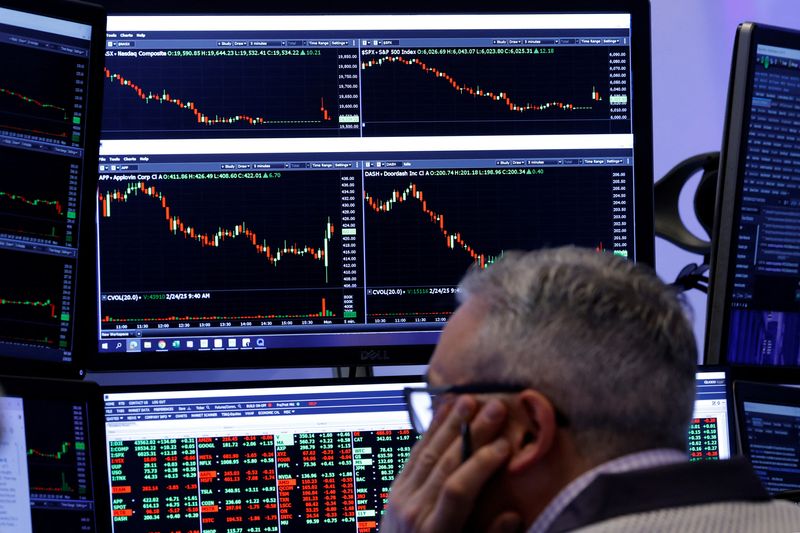
By Alden Bentley, Harry Robertson and Wayne Cole
NEW YORK/LONDON/SYDNEY (Reuters) -Wall Street struggled for traction on Monday, ending mixed after slumping last week, while German election results buoyed German shares and Europe’s single currency as investors waited for midweek results from artificial intelligence chip leader Nvidia.
The euro’s positive reaction to Sunday’s conservative election victory in Germany, the currency bloc’s largest economy, capped the dollar.
U.S. stock indexes swapped moderate gains and losses all day, mostly succumbing to more of the same uncertainty about U.S. growth and valuations and geopolitics that helped knock the S&P 500 back from record highs set early last week.
The S&P 500 closed down 0.53% the Nasdaq Composite fell 1.19%. The Dow Jones Industrial Average rose 0.08%.
In recent sessions, weak U.S. retail sales, consumer confidence and services purchasing managers’ reports, combined with higher-than-expected consumer price inflation, have eroded market confidence and, amid uncertainty over a barrage of federal government layoffs, have put U.S. stagflation in center of investor calculations.
“Now we’re looking at other things, whether it’s uncertainty, geopolitical, whether we’re finally looking at earnings and things like that affect markets,” said Joe Saluzzi, co-head of equity trading at Themis Trading.
Saluzzi said investors are distracted by German elections, the war in Ukraine, and a range of other headlines. “People get scared quick,” he said.
U.S. markets opened firmer, taking in a rally in German stocks, along with the euro, which hit a one-month high after German voters put centrist parties on track to form a coalition.
Friedrich Merz was set to become Germany’s next chancellor after his opposition conservatives won the national election. Merz should be able to form a coalition to govern with the ruling centre-left Social Democrats, even though the party came third behind the far-right Alternative for Germany.
“In the end (it was) a result that was close to the latest exit polls and should be a very market-friendly outcome,” said Peter Schaffrik, global macro strategist at RBC Capital Markets.
Germany’s DAX stock index rose 0.62% but the pan-European STOXX 600 index fell 0.08%.
MSCI’s gauge of stocks across the globe fell 0.48%.
The start of German coalition talks comes as EU leaders are set to hold an extraordinary summit on March 6 to discuss additional support for Ukraine and how to pay for European defence needs.